

Disclaimer: This article is for informational purposes only and is not intended to diagnose any conditions. LifeDNA does not provide diagnostic services for any conditions mentioned in this or any other article.
A chloride blood test measures the level of chloride in your blood. Chloride is an essential electrolyte in body fluids that helps maintain acid-base balance, fluid balance, and nerve function. This test is typically part of a comprehensive metabolic panel (CMP) or an electrolyte panel used to assess overall health, ot to diagnose various conditions. The normal range for chloride in the blood is typically between 96 and 106 milliequivalents per liter (mEq/L). However, this can vary slightly depending on the specific laboratory standards.
A blood sample is drawn from a vein in your arm to perform the test. The test helps monitor conditions like dehydration, kidney disease, heart failure, and acid-base imbalances. Doctors may also request this test if you experience symptoms like prolonged vomiting, diarrhea, weakness, breathing difficulties, or prolonged fatigue, as these could indicate an imbalance of electrolytes.
Results outside the normal range can indicate various health issues. High chloride levels, known as hyperchloremia, can result from dehydration, kidney disease, or excessive intake of saline fluids. Low levels, or hypochloremia, can be caused by conditions such as chronic lung diseases, congestive heart failure, or prolonged vomiting. Understanding chloride levels can help healthcare providers diagnose and manage these underlying conditions more effectively.
If your blood chloride levels are high, a condition known as hyperchloremia, this often indicates an underlying health issue that needs addressing. Dehydration, which concentrates chloride in the blood, can cause elevated chloride levels. It can also result from kidney disorders where the kidneys fail to filter out chloride properly, leading to an accumulation. Conditions like metabolic acidosis, where the body produces too much acid or the kidneys are not removing enough acid, can also elevate chloride levels.
High chloride levels may lead to symptoms such as high blood pressure, muscle weakness, confusion, and irregular heartbeats. Chronic hyperchloremia can exacerbate existing health problems, particularly those related to the heart and kidneys.
One must identify and treat the underlying cause to address high chloride levels. For dehydration, increasing fluid intake is essential. If kidney disease is the cause, managing the kidney condition through medication, diet, and possibly dialysis is crucial. In cases of metabolic acidosis, treatment might include bicarbonate supplements to neutralize excess acid.
Regular monitoring and follow-up tests are often necessary to ensure chloride levels return to normalcy and remain stable. Dietary adjustments, such as reducing salt intake and staying hydrated, can also help manage and prevent hyperchloremia.
Genetics can influence chloride levels in various parts of the body, though it is often one of several factors.
CLCN1 gene variants affect chloride levels by altering the function of the ClC-1 chloride channel, which plays a critical role in regulating chloride ion flow in muscle cells. The ClC-1 channel is essential for maintaining the electrical stability of muscle cell membranes by controlling the movement of chloride ions in and out of cells. This regulation helps to stabilize the resting membrane potential and prevent excessive muscle excitability.
Mutations in the CLCN1 gene, the resulting ClC-1 channels may become dysfunctional. It can lead to an imbalance in chloride ion flow, causing either reduced chloride conductance or altered gating properties of the channel. In muscle cells, this can result in a decreased ability to counterbalance the excitatory influx of sodium ions, leading to prolonged muscle contractions or myotonia.
While genetics can influence chloride levels, it usually does go along with other factors such as diet, hydration status, medications, and underlying health conditions. Understanding one’s genetic predisposition can help anticipate and manage potential electrolyte imbalances, including those involving chloride. Genetic testing and counseling might benefit individuals with a family history of conditions affecting electrolyte balance.
Genetic disorders like cystic fibrosis affect chloride channels, disrupting chloride and sodium ion transport, leading to thick mucus buildup and altered chloride levels in sweat and body fluids. Similarly, mutations in the renin-angiotensin-aldosterone system, which regulates blood pressure and fluid balance, can affect chloride management. Conditions such as Bartter syndrome and Gitelman syndrome, which are rare genetic kidney disorders, impair electrolyte reabsorption, causing chloride imbalances. Genetic predispositions to hormonal imbalances, such as congenital adrenal hyperplasia, disrupt hormone production and electrolyte regulation, further affecting chloride levels. These genetic factors and disorders highlight the complex regulation of chloride in the body.
Elevated chloride levels in your lab results, or hyperchloremia, can arise from several underlying causes. One of the most common reasons is dehydration. When the body loses water through excessive sweating, vomiting, diarrhea, or inadequate fluid intake, chloride concentration in the blood increases.
Metabolic acidosis happens when the body produces too much acid or the kidneys do not remove enough acid. This imbalance often results in elevated chloride levels as the body tries to maintain a neutral pH by retaining chloride.
Understanding the specific cause of hyperchloremia is crucial for proper treatment. Identifying and addressing the underlying condition, whether dehydration, kidney dysfunction, or another factor, is essential to restoring normal chloride levels and maintaining overall health.
Reducing high chloride levels involves addressing the underlying causes and making lifestyle and dietary adjustments. Here are several strategies:
By making these lifestyle and dietary changes, we can naturally manage and reduce high chloride levels, contributing to better overall health and electrolyte balance.
Hydration and a healthy diet are key variables for controlling your chloride levels. The LifeDNA Nutrition Report provides personalized insights based on your genetics, lifestyle, and dietary habits. It offers practical guidance on meeting your unique nutrient requirements, including the importance of water intake. Get your report today.


